Kia Ceed Sportswagon VS Mazda MX-30 – Specs, Efficiency & Price Comparison
Which model is the better choice – the Kia Ceed Sportswagon or the Mazda MX-30? We compare performance (140 HP vs 170 HP), boot capacity (625 L vs 350 L), efficiency (6 L vs 18.30 kWh), and of course, the price (24000 £ vs 30800 £).
Find out now which car fits your needs better!
The Kia Ceed Sportswagon (Estate) is powered by a Petrol MHEV or Petrol engine and comes with a Automatic or Manuel transmission. In comparison, the Mazda MX-30 (SUV) features a Plugin Hybrid engine and a Automatic gearbox.
When it comes to boot capacity, the Kia Ceed Sportswagon offers 625 L, while the Mazda MX-30 provides 350 L – depending on what matters most to you. If you’re looking for more power, you’ll need to decide whether the 140 HP of the Kia Ceed Sportswagon or the 170 HP of the Mazda MX-30 suits your needs better.
There are also differences in efficiency: 6 L vs 18.30 kWh. In terms of price, the Kia Ceed Sportswagon starts at 24000 £, while the Mazda MX-30 is available from 30800 £.
Compare all the key specs now and find out which model fits your lifestyle best!
Kia Ceed Sportswagon
The Kia Ceed Sportswagon is a versatile estate car that combines practicality with a touch of elegance. It offers a spacious interior, making it ideal for families or those with an active lifestyle. The vehicle's sleek design and advanced features make it a strong contender in the competitive estate car market.
details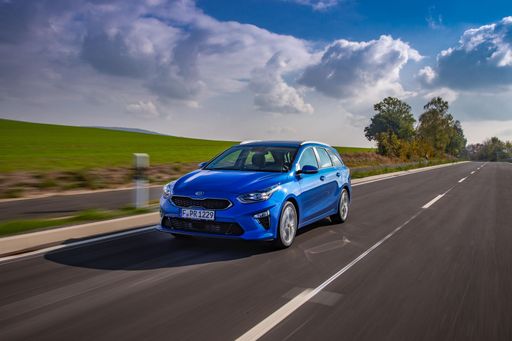 @ press.kia.com
@ press.kia.com
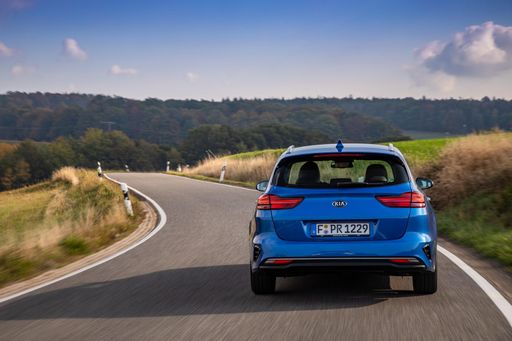 @ press.kia.com
@ press.kia.com
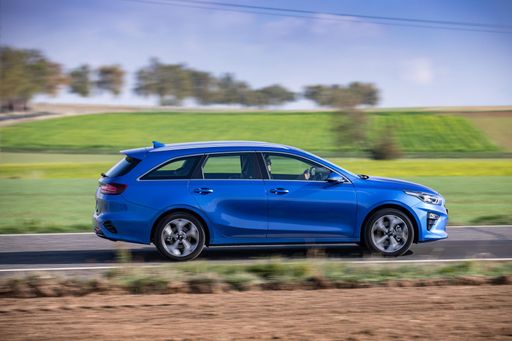 @ press.kia.com
@ press.kia.com
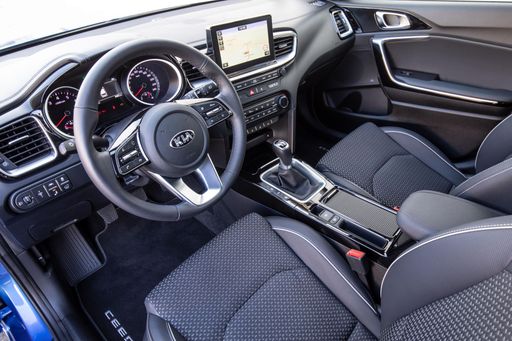 @ press.kia.com
@ press.kia.com
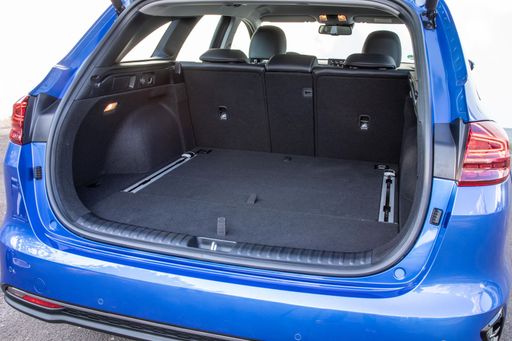 @ press.kia.com
@ press.kia.com
Mazda MX-30
The Mazda MX-30 is a compact crossover that combines unique design with an environmentally conscious approach. Its distinct exterior features a coupe-like silhouette and freestyle doors that offer practicality and style. Inside, the cabin boasts sustainable materials, creating a harmonious blend of modern aesthetics and eco-friendly innovation.
details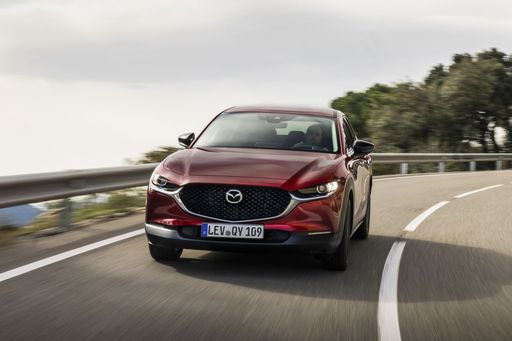 @ de.mazda-press.com
@ de.mazda-press.com
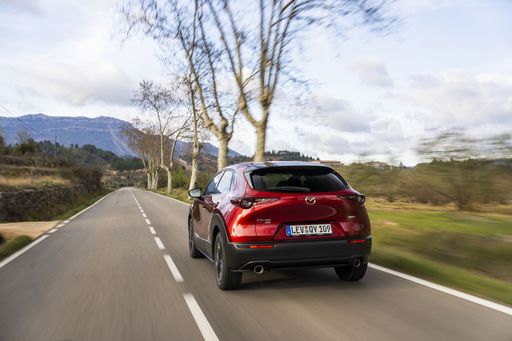 @ de.mazda-press.com
@ de.mazda-press.com
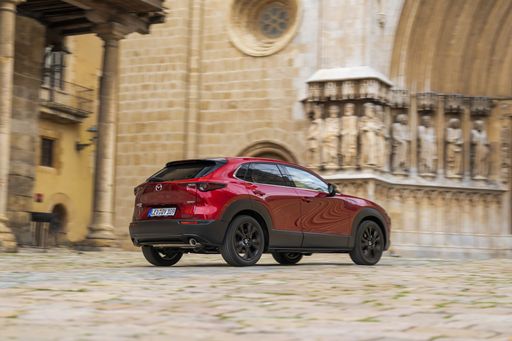 @ de.mazda-press.com
@ de.mazda-press.com
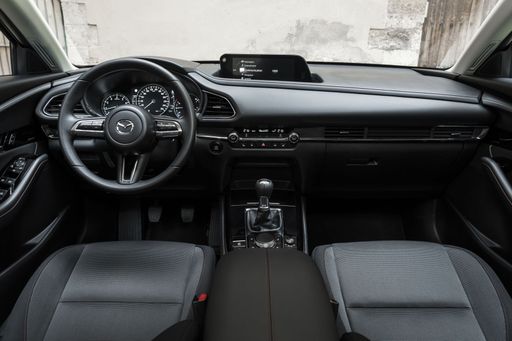 @ de.mazda-press.com
@ de.mazda-press.com

|

|
|
|
|
Costs and Consumption |
|
|---|---|
|
Price
24000 - 32600 £
|
Price
30800 - 37100 £
|
|
Consumption L/100km
6 - 6.4 L
|
Consumption L/100km
-
|
|
Consumption kWh/100km
-
|
Consumption kWh/100km
18.30 kWh
|
|
Electric Range
-
|
Electric Range
85 km
|
|
Battery Capacity
-
|
Battery Capacity
-
|
|
co2
137 - 146 g/km
|
co2
22 g/km
|
|
Fuel tank capacity
50 L
|
Fuel tank capacity
-
|
Dimensions and Body |
|
|---|---|
|
Body Type
Estate
|
Body Type
SUV
|
|
Seats
5
|
Seats
5
|
|
Doors
5
|
Doors
5
|
|
Curb weight
1335 - 1437 kg
|
Curb weight
1849 kg
|
|
Trunk capacity
512 - 625 L
|
Trunk capacity
332 - 350 L
|
|
Length
4605 mm
|
Length
4395 mm
|
|
Width
1800 mm
|
Width
1848 mm
|
|
Height
1422 - 1465 mm
|
Height
1555 mm
|
|
Payload
455 - 485 kg
|
Payload
402 kg
|
Engine and Performance |
|
|---|---|
|
Engine Type
Petrol MHEV, Petrol
|
Engine Type
Plugin Hybrid
|
|
Transmission
Automatic, Manuel
|
Transmission
Automatic
|
|
Transmission Detail
Automat. Schaltgetriebe (Doppelkupplung), Schaltgetriebe
|
Transmission Detail
-
|
|
Drive Type
Front-Wheel Drive
|
Drive Type
Front-Wheel Drive
|
|
Power HP
100 - 140 HP
|
Power HP
170 HP
|
|
Acceleration 0-100km/h
9.7 - 13.5 s
|
Acceleration 0-100km/h
9.10 s
|
|
Max Speed
178 - 197 km/h
|
Max Speed
140 km/h
|
|
Torque
172 - 253 Nm
|
Torque
-
|
|
Number of Cylinders
3 - 4
|
Number of Cylinders
-
|
|
Power kW
74 - 103 kW
|
Power kW
125 kW
|
|
Engine capacity
998 - 1482 cm3
|
Engine capacity
830 cm3
|
General |
|
|---|---|
|
Model Year
2024
|
Model Year
2025
|
|
CO2 Efficiency Class
E
|
CO2 Efficiency Class
B
|
|
Brand
Kia
|
Brand
Mazda
|
Kia Ceed Sportswagon
Introducing the Kia Ceed Sportswagon: A Blend of Style and Functionality
The Kia Ceed Sportswagon has entrenched itself as a preferred choice for families and individuals alike, merging dynamic styling with an impressive suite of functionalities. Embodying the attributes of a classic estate car, it offers ample space without compromising on elegance or driving performance.
Innovative Powertrains: Bridging Performance and Efficiency
The Ceed Sportswagon comes equipped with a range of powertrains designed to meet varying customer needs. From traditional petrol options to innovative mild-hybrid and plug-in hybrid systems, the range is catered to deliver on efficiency and power. The plug-in hybrid variant, especially, stands out with its ability to travel up to 50 km purely on electric power, and a remarkable combined fuel consumption of 1.3 L/100 km.
Performance Specifications: Power Meets Precision
Depending on the choice of engine, drivers can experience power outputs ranging from 100 to 141 PS, complemented by torque values between 172 and 265 Nm. Acceleration capabilities vary, with 0-100 km/h achieved in times ranging from 9.7 to 13.5 seconds, providing a performance spectrum to cater to different needs, be it efficiency or spirited driving.
State-of-the-Art Technology and Safety
Kia has packed the Ceed Sportswagon with an array of technological innovations aimed at improving safety and driving experience. From advanced driver-assistance systems to connectivity solutions, the car ensures both the driver and passengers stay safe, informed, and entertained throughout their journey.
Design and Comfort: A Space That Inspires
Aesthetically, the Ceed Sportswagon is both modern and sleek, with a length of up to 4605 mm and a height of up to 1465 mm ensuring a spacious interior. The boot space offers between 437 and 625 litres, catering not only to daily errands but also to road trips. Inside, the seating configuration comfortably accommodates five passengers, making it ideal for families and groups.
Economic Offering: Value for Money
With prices ranging from €26,590 to €42,080, the Ceed Sportswagon presents itself as an economically compelling option without skimping on quality or features. Furthermore, with different equipment lines available, from the elegant Vision to the sport-oriented GT Line, buyers have the flexibility to choose a model that aligns with their lifestyle and preferences.
In Summary: The Complete Package
The Kia Ceed Sportswagon is a testament to Kia's commitment to innovation, quality, and design. Perfectly balancing practicality and performance, it remains a formidable contender in the estate segment, appealing to those who seek a versatile vehicle capable of addressing a multitude of daily driving needs with flair and reliability.
Mazda MX-30
The Electric Revolution: Mazda MX-30
The Mazda MX-30 represents a bold leap into the realm of sustainable mobility, bringing a distinct blend of style, efficiency, and innovation. As Mazda's first all-electric vehicle, the MX-30 is designed to capture the hearts of eco-conscious drivers while delivering the fun driving experience the brand is known for. Let’s delve into what makes this vehicle stand out in the increasingly crowded electric vehicle market.
Sleek Design Meets Practicality
The MX-30 is a compact SUV that exudes a modern aesthetic with its clean lines and contemporary silhouette. Measuring 4,395 mm in length and 1,848 mm in width, the MX-30 is designed to navigate city streets with ease. Its unique freestyle doors facilitate easy access to the front and rear seats, accommodating up to five passengers comfortably.
Advanced Electric Powertrain
At the heart of the MX-30 is Mazda's e-SKYACTIV drivetrain, available in both fully electric and plug-in hybrid variants. The electric version delivers a respectable 145 PS (107 kW), whereas the plug-in hybrid offers an enhanced 170 PS (125 kW). Both versions employ front-wheel drive with a single-speed reduction gearbox, ensuring a smooth and responsive ride.
Efficiency and Range
The MX-30 showcases commendable efficiency with a power consumption ranging from 17.5 to 17.9 kWh per 100 km. Drivers can expect a maximum electric range of 200 km for the fully electric model, while the plug-in hybrid offers 85 km on electric power alone. This ensures the MX-30 is well-suited for both daily commutes and extended journeys.
Elegant Interiors and Cutting-Edge Technology
Inside, the MX-30 presents a zen-like cabin featuring sustainable materials like cork and recycled fabrics, reinforcing Mazda’s commitment to environmental consciousness. The vehicle comes equipped with a host of technological advancements, including a digital dashboard and a user-friendly infotainment system that keeps drivers connected and informed on the go.
Performance and Handling
Mazda's dedication to driving pleasure continues with the MX-30. With an acceleration time from 0-100 km/h between 9.1 to 9.7 seconds and a top speed of 140 km/h, it promises an engaging drive. The low centre of gravity, courtesy of the battery placement, and its precise steering ensure the MX-30 feels agile and responsive, whether navigating urban environments or open roads.
Safety and Features
Safety is paramount in the MX-30, which boasts an array of advanced features, including collision avoidance systems and a reinforced body structure. It also scores well on CO2-efficiency, rated between Class A and B, making it a responsible choice for eco-minded consumers.
Conclusion: Mazda MX-30 – A Vision of the Future
In conclusion, the Mazda MX-30 is a testament to the brand's innovative spirit and commitment to sustainability. With its combination of striking design, efficient powertrains, and cutting-edge technology, the MX-30 is a formidable competitor in the electric vehicle market. Offering a blend of sophistication and performance, it is poised to win over motorists who seek an environmentally friendly vehicle without compromising on driving joy.
The prices and data displayed are estimates based on German list prices and may vary by country. This information is not legally binding.
